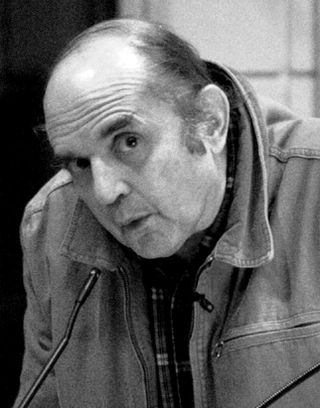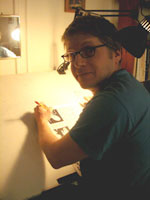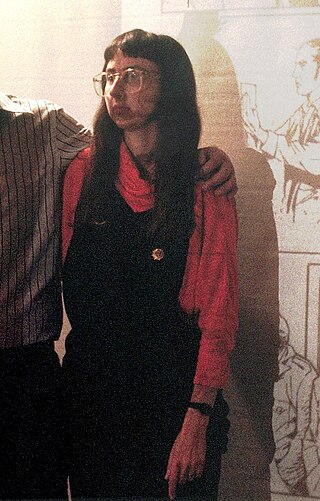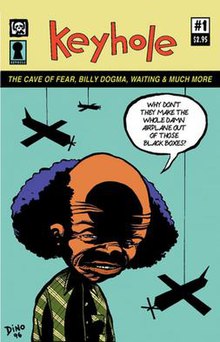
Robert Dennis Crumb is an American cartoonist who often signs his work R. Crumb. His work displays a nostalgia for American folk culture of the late 19th and early 20th centuries, and satire of contemporary American culture.

American Splendor is a series of autobiographical comic books written by Harvey Pekar and drawn by a variety of artists. The first issue was published in 1976 and the last one in September 2008, with publication occurring at irregular intervals. Publishers were, at various times, Harvey Pekar himself, Dark Horse Comics, and DC Comics.

Harvey Lawrence Pekar was an American underground comic book writer, music critic, and media personality, best known for his autobiographical American Splendor comic series. In 2003, the series inspired a well-received film adaptation of the same name.
An autobiographical comic is an autobiography in the form of comic books or comic strips. The form first became popular in the underground comix movement and has since become more widespread. It is currently most popular in Canadian, American and French comics; all artists listed below are from the U.S. unless otherwise specified.

Weirdo was a magazine-sized comics anthology created by Robert Crumb and published by Last Gasp from 1981 to 1993. Featuring cartoonists both new and old, Weirdo served as a "low art" counterpoint to its contemporary highbrow Raw, co-edited by Art Spiegelman.

Top Shelf Productions is an American publishing company founded in 1997, originally owned and operated by Chris Staros and Brett Warnock and a small staff. Now an imprint of IDW Publishing, Top Shelf is based in Marietta, Georgia.
Alternative Comics was an American independent graphic novel and comic book publisher most recently based in Cupertino, California. In addition to publishing creator-owned titles, Alternative Comics was also a noted publisher of anthologies such as 9-11: Emergency Relief, Hi-Horse, Hickee, Rosetta, and True Porn.
Gary G. Dumm is an American comic book artist known particularly for his work illustrating the comics of Harvey Pekar.

Toby Radloff is a former file clerk and actor who became a minor celebrity owing to his appearances in Cleveland writer Harvey Pekar's autobiographical comic book series American Splendor. Radloff has a distinctive manner of speech and quirky mannerisms. He is a self-proclaimed "Genuine Nerd".

Dean Edmund Haspiel is an American comic book artist, writer, and playwright. He is known for creating Billy Dogma, The Red Hook, and for his collaborations with writer Harvey Pekar on his American Splendor series as well as the graphic novel The Quitter, and for his collaborations with Jonathan Ames on The Alcoholic and HBO's Bored to Death. He has been nominated for numerous Eisner Awards, and won a 2010 Emmy Award for TV design work.

Josh Neufeld is an alternative cartoonist known for his comics journalism work on subjects like graphic medicine, equity, and technology; as well as his collaborations with writers like Harvey Pekar and Brooke Gladstone. He is the writer/artist of A.D.: New Orleans After the Deluge, and the illustrator of The Influencing Machine: Brooke Gladstone on the Media.

Joyce Brabner was an American writer of political comics and the widow of Harvey Pekar.
Brian Bram, raised in Deerfield, Illinois, played a minor role in the underground comix movement with his contributions to American Splendor, the comic book series written and published by Harvey Pekar and, more recently, with his work with author Jonathan Baylis on his autobiographical comic series, So...Buttons.

ACT-I-VATE was an American webcomics collective based on an original idea by Dean Haspiel and founded by Haspiel and seven other cartoonists. It started out on the blogging platform Livejournal, and then moved to its own dedicated website.

Millennium Publications was an American independent comic book publishing company active in the 1990s.

Dennis P. Eichhorn was an American writer, best known for his adult-oriented autobiographical comic book series Real Stuff. His stories, often involving, sex, drugs, and alcohol, have been compared to those of Jack Kerouac, Ken Kesey, and Charles Bukowski.

Edward R. Piskor Jr. was an American alternative comics cartoonist. Piskor was known primarily for his work on Hip Hop Family Tree, X-Men: Grand Design, and the Red Room trilogy. Piskor also co-hosted the YouTube channel Cartoonist Kayfabe with fellow Pittsburgh native cartoonist Jim Rugg. In March 2024, Piskor was accused via social media of sexual misconduct. Piskor died on April 1, 2024, at the age of 41, hours after posting a suicide note via social media, defending himself against the allegations leveled against him.
Robert Armstrong is a cartoonist, illustrator, painter, and musician. He is known for his underground comix character Mickey Rat, for popularizing the term "couch potato," and for being a member of Robert Crumb's band the Cheap Suit Serenaders.
Willy Murphy was an American underground cartoonist. Murphy's humor focused on hippies and the counterculture. His signature character was Arnold Peck the Human Wreck, "a mid-30s beanpole with wry observations about his own life and the community around him." Murphy's solo title was called Flamed-Out Funnies; in addition, he contributed to such seminal underground anthologies as Arcade, Bijou Funnies, and San Francisco Comic Book, as well as the National Lampoon.
Greg Budgett is a Cleveland, Ohio-based comic book artist known particularly for his work illustrating the comics of Harvey Pekar. Most of Budgett's work on Pekar's American Splendor and other comics has been in partnership with Gary Dumm, who has inked most of Budgett's stories.












